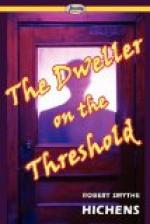“I think we should live by the truth, and I would gladly strike away a lie from any human being who was using it as a crutch.”
“I thought that once,” said Chichester.
The words were ordinary enough, but there was something either in the way they were said, or in Chichester’s face as he said them, that made Malling turn cold.
To cover his unusual emotion, which he was ashamed of, and which he greatly desired to hide from his companion, he blew out a puff of cigar smoke, lifted his cup, and drank the rest of his coffee.
“May I have another cup?” he said. “It’s excellent.”
The coffee-pot was on the table. Chichester poured out some more.
“I will have another cup, too,” he said. “How it wakes up the mind.”
He glanced at Mailing and added:
“Almost terribly sometimes.”
“Yes. But—going back to our subject—don’t you still think that men should live by the truth?”
“I think,” began Chichester—“I think—”
It seemed as if something physical prevented him from continuing. He swallowed, as if forcing something down his throat.
“I think,” he got out at last, “that few men know how terrible the face of truth can be.”
His own countenance was contorted as he spoke, as if he were regarding something frightful.
“I think”—he turned right round in his chair to confront Malling squarely—“that you do not know.”
For the first time he completely dominated Malling, Chichester the gentle, cherubic clergyman, whom Malling had thought of as good, but weak, and certainly as a negligible quantity. He dominated, because at that moment he made Malling feel as if he had some great possession of knowledge which Malling lacked.
“And you?” said Malling. “Do you know?”
The curate’s lips worked, but he made no answer.
Malling was aware of a great struggle in his mind, as of a combat in which two forces were engaged. He got up, walked to the window, and stood as if listening to the rain.
“If only Stepton were here!” thought Malling.
There was a truth hidden from him, perhaps partly divined, obscurely half seen, but not thoroughly understood, as a whole invisible. Stepton would be the man to elucidate it, Malling thought. It lured him on, and baffled him.
“How it rains!” said the curate at last, without turning.
He bent down and opened the small window. The uneasy, almost sinister noise of rain in darkness entered the room, with the soft smell of moisture.
“Do you mind if we have a little air?” he added.
“I should like it,” said Malling.
Chichester came back and sat down again opposite Malling. His expression had now quite changed. He looked calmer, gentler, weaker, and much more uninteresting. Crossing his legs, and folding his thin hands on his knees, he began to talk in his light tenor voice. And he kept the conversation going on church music, sacred art in Italy, and other eminently safe and respectable topics till it was time for Malling to go.




